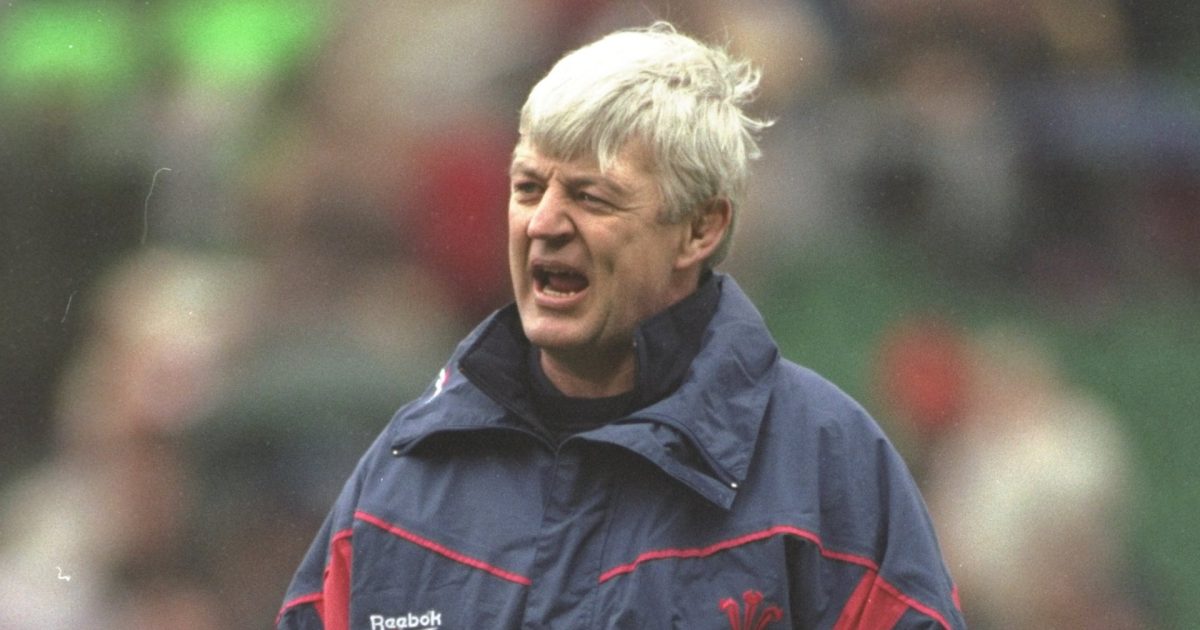WRU obituary: Death of Kevin Bowring, Wales' first professional coach

The Welsh Rugby Union have published an obituary following the death of Kevin Bowring. The 70-year-old, who suffered a heart attack, was Wales’ first professional coach having answered an advert when the game turned pro in the mid-1990s.
The WRU obit read: “Kevin Bowring, Welsh rugby’s first professional coach, has died after suffering a heart attack at the age of 70. The Neath-born flanker became a legendary figure at London Welsh, where he made 268 games as a player and captained the club for three seasons, and was good enough to be picked for a Wales B squad, play three times for the Barbarians and also represent Middlesex County.
“The son of a carpenter, he learned his rugby at Neath Grammar School before heading to Borough Road College in London to study to become a PE teacher. He captained the team and also cut his teeth in first class rugby by making his debut for Neath.
“Having grown up as a regular at The Gnoll and wanting to be like the Neath and Wales back row legend Dai Morris, he got the chance to play alongside the great man in a never to be forgotten experience.
“A renowned sevens specialist, it was during a trip to the Amsterdam Sevens with the Voyagers that he was invited by Wales wing Clive Rees to join London Welsh. The two were teaching at the same school in reading at the time and he joined the Old Deer Park side in 1977.
RIP Kevin Bowring. ?
Mentored me, taught me, moulded me. Pushed my thinking upstream, when as a young coach I only ever swam downstream. Made me always want to learn, to grow. A beautiful man and I will carry his spirit in all I continue to do. Rest in Peace Kev. ?? pic.twitter.com/3pTpg94nHj— Ben Ryan (@benjaminryan) October 11, 2024
“During his nine-year stay at the club, he was captain from 1979-82, became the sixth most capped player for the Exiles, played in the side that reached the John Player Cup final in 1985 and played in three teams that reached the Middlesex Sevens final at Twickenham, winning at the third attempt in 1984.
“His coaching career began when he was just out of his teens when he helped out with the youth team at his first rugby club, Briton Ferry. Then, after hanging up his boots at the age of 32, he took on the role of director of physical education and head of games at Clifton College.
“During his time at Clifton his reputation grew and he was invited to take part in the WRU’s U17 and U18 development camps in Aberystwyth. The WRU’s coaching director at the time was the former London Welsh, Wales and British and Irish Lions captain John Dawes, who invited Bowring to coach Wales U20 in 1989-90.
“He then went on to take charge of Wales U21 for three years and then won nine of his 13 games in charge of Wales A over a further three years. He also coached the Wales Sevens side. He was named as the caretaker coach for the autumn international against Fiji in November 1995, which Wales won 19-15, and was then given a £50,000 per annum four-year contract to take the team through to the home World Cup in 1999.
“Having answered the WRU’s advert for what would become the first professional Wales coach, he was given the job. He ended his 29-match career over his two-and-a-half years in-situ in credit with 15 wins and 14 defeats, although his Five Nations record saw him win only four of his 12 games.
“When he took over Wales had just failed to qualify for the knock-out stages of the World Cup for the second tournament running, their championship record since 1988 had been patchy with just seven victories in 28 matches and they had lost to Romania, Canada and Western Samoa in that time.
“He ultimately became the fifth Welsh coach in 10 years to vacate the position reluctantly. He left in the end frustrated that the Welsh Rugby Union refused to sanction a series of demands he had drawn up, the basis of which would have seen the club system at the top scrapped in favour of a provincial structure.
“His contention was that the club scene was not producing players ready for the international arena and neither was it yielding international coaches for the future. He attempted to restore a more typically Welsh style of game, but ultimately resigned after suffering record defeats against England and then Grand Slam France, who won 51-0 at Wembley in 1998.
“He was succeeded by Graham Henry as national coach and went on to coach Newbury RFC. He was later employed by the Rugby Football Union as an elite coach for the England rugby union team. He also became a board member of UK Coaching and a member of the coaching committee, which sets the overall strategy for sports coaching in the UK. He also worked with the WRU as a coach mentor.
“The WRU sends sincere condolences to Kevin’s wife, Wendy, and the rest of his family and friends.”
Kevin Bowring… if coaching is about your coaching tree, Kevin planted forests, if it's about the ripples you create he threw boulders in the lake, if it's about the footprint you leave he took a million steps. An amazing human, coach, mentor and friend.. the best of the best ?? pic.twitter.com/KP27sZCkxi
— RussellEarnshaw (@russellearnshaw) October 11, 2024












































































